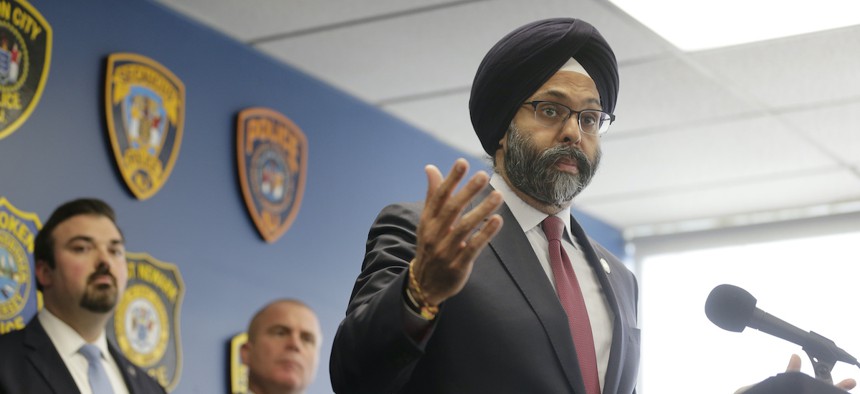'Systemic Buy-In:' How New Jersey Approaches Police Reform

New Jersey Attorney General Gurbir Grewal speaks during a news conference in Jersey City, N.J., Thursday, Dec. 12, 2019. Associated Press
In New Jersey, comprehensive police reform began by listening to community members, law enforcement agencies and civil rights organizations, Gurbir S. Grewal, the state's attorney general, said during a Route Fifty event.
Next January, police officers in New Jersey will be prohibited from using physical force against civilians except as a last resort. The change, announced in December, was the first revision the state’s use-of-force policy had undergone in nearly two decades; just one of a handful of sweeping police reform measures implemented in 2020 by New Jersey Attorney General Gurbir S. Grewal.
The changes—including an overhaul of police training standards, the creation of a licensing system and a requirement that law enforcement agencies identify police officers who commit serious disciplinary violations—garnered headlines in a year that saw nationwide protests against police brutality and racism. But the process of implementing those policies began years ago, Grewal said.
“Systemic change requires systemic buy-in,” he said in a pre-recorded interview for Route Fifty’s State of the State event Monday. To achieve that, state officials held listening sessions across the state, fielded thousands of public comments and had meetings with a range of professional associations, unions and other groups, including the New Jersey State Association of Chiefs of Police, the American Civil Liberties Union, the NAACP and the National Organization of Black Law Enforcement Executives.
“Not everybody got everything they wanted, but when we released the policy, they all stood shoulder to shoulder with me, standing behind this policy,” Grewal said. “And that is powerful, because you don’t normally see that.”
The changes to the state’s use-of-force policy were particularly broad, which Grewal framed as a “rethinking of how we view police conduct and interactions.” The main three components, he said, focus on helping officers avoid situations where use of force is necessary by “improving training and changing culture,” placing strict limits on how and when officers may use force, and a comprehensive review of every incident where force is used.
Each change stems from the same core principle, he said.
“We start with the basic premise that in every law enforcement interaction, we are going to respect the sanctity of life and the dignity of the person we’re interacting with,” he said. “We’re giving a whole suite of tools to our cops to avoid use of force should a situation escalate, and we’re helping them de-escalate through other techniques.”
Among those techniques is training on how to be what Grewal called “active bystanders,” a change sparked in part by the handful of junior officers in Minneapolis who, last May, stood by watching while another officer, Derek Chauvin, kneeled on George Floyd's neck for about eight minutes before Floyd died. That incident led to widespread protests.
“You change culture by having robust training,” Grewal said. “We’re training not just how force should be used, but how to de-escalate situations with real-life scenarios, and we’re having law enforcement lead these trainings, because they can speak best to these issues.”
Grewal’s office works on a host of other issues as well, he noted, including the increase of domestic terrorism and violent extremism. But police reform, viewed through the lens of addressing systemic racism, remains his first priority.
“I hope in the midst of all of that, we don’t lose sight of the issues we had a collective momentum to address this past summer,” he said. “I have an extreme sense of urgency to make sure that I use my time in office to really do what I can to fix these deep, structural problems.”
Kate Elizabeth Queram is a staff correspondent for Route Fifty and is based in Washington, D.C.
NEXT STORY: Anti-Vaccine Activists Peddle Theories That Covid Shots Are Deadly, Undermining Vaccination





